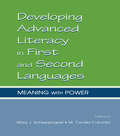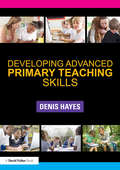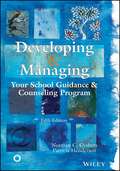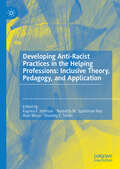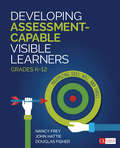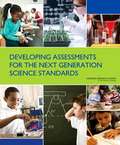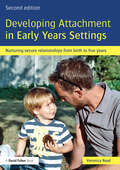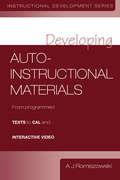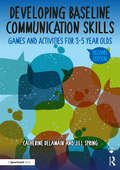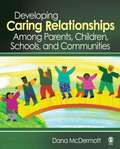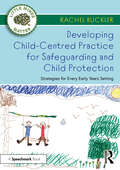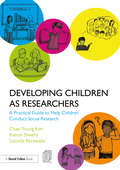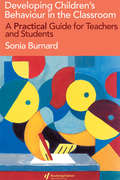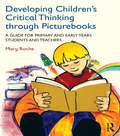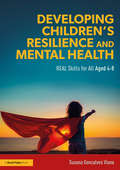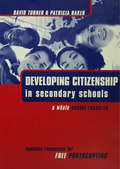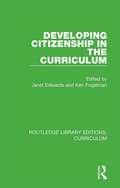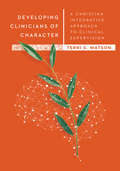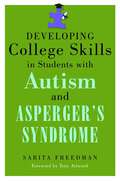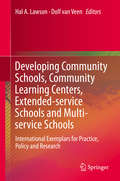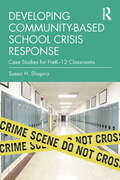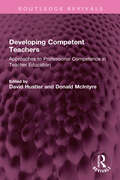- Table View
- List View
Developing Advanced Literacy in First and Second Languages: Meaning With Power
by Mary J. Schleppegrell M. Cecilia ColombiThis book addresses the linguistic challenges faced by diverse populations of students at the secondary and post-secondary levels as they engage in academic tasks requiring advanced levels of reading and writing. Learning to use language in ways that meet academic expectations is a challenge for students who have had little exposure and opportunity to use such language outside of school. Although much is known about emergent literacy in the early years of schooling, much less has been written about the development of advanced literacy as students move into secondary education and beyond. Developing Advanced Literacy in First and Second Languages: Meaning With Power: *brings together work on first and second language acquisition and emphasizes the importance of developing advanced literacy in the first language, such as Spanish for bilingual students, as well as English; *spans a range of theoretical orientations and analytic approaches, drawing on work in systemic functional linguistics, genre theory, and sociocultural perspectives; *addresses the content areas of science, history, and language arts; *provides specific information about genres and grammatical features in these content areas; and *presents suggestions for teacher education. What unites the contributors to this volume is their shared commitment to a view of literacy that emphasizes both the social contexts and the linguistic challenges. The chapters collected in this volume contribute in important ways to research and pedagogy on advanced literacy development for the multilingual and multicultural students in today's classrooms. This book is particularly useful for researchers and students in language and education, applied linguistics, and others concerned with issues and challenges of advanced literacy development in first and second languages.
Developing Advanced Primary Teaching Skills
by Denis HayesDo you believe that continuous improvement in teaching is essential? Do you wish to enhance your understanding of how children learn? Are you eager to become a well-informed professional? From the author of the hugely respected Foundations of Primary Teaching, this advanced textbook explores the essential elements of teaching and learning and the process of becoming a caring and competent teacher. It introduces a wide range of education issues, challenges and requirements with the intention of promoting advanced classroom practice, both for individuals and within teams. The book offers insights, ideas, hints and thought-provoking education topics for individual reflection and team discussion. With a focus on understanding the teaching and learning processes and the factors that impact upon providing a high quality education for every pupil, this book discusses in detail key learning skills, dilemmas and challenges for primary teachers and themes in continuing professional development. It covers issues in teaching and learning including: The nature/nurture debate Motivation Emotional and moral development Raising boys’ achievement levels Gender and teachers Accelerated learning Reflective practice. Including action points, hints and challenges, this book will be of interest to trainee teachers, postgraduates, experienced qualified teachers, deputy head teachers and head teachers who wish to be more consistently effective and make a positive impact on the lives of children in their primary classroom.
Developing And Managing Your School Guidance And Counseling Program (Fifth Edition)
by Norman C. Gysbers Patricia HendersonFive phases for establishing and improving Pre-K-12 comprehensive guidance and counseling programs serve as the organizational framework for this enduring, influential textbook written for counselor educators and their students, school leaders, practicing school counselors, and state or district supervisors. <P><P>The fifth edition of this bestseller expands and extends Gysbers and Henderson's acclaimed model for planning, designing, implementing, evaluating, and enhancing counseling programs and has been fully updated to reflect current theory and practice, including knowledge gained through various state and local adaptations of the model since publication of the last edition. New to this edition are increased attention to diversity and the range of issues students present, counselor accountability, and the roles and responsibilities of district- and building-level guidance and counseling leaders in an increasingly complex educational environment. <P><P>An abundant array of examples, sample forms, job descriptions, evaluation surveys, flyers, letters, and procedures used by various states and school districts clearly illustrate each step of program development. At the end of each chapter, a new feature called "Your Progress Check" functions as a tracking tool for growth at each stage of the change process. <P><P>This book is divided into five parts: (1) Planning; (2) Designing; (3) Implementing; (4) Evaluating; and (5) Enhancing. Appended are: (1) American School Counselor Association Ethical Standards for School Counselors; (2) Guidelines and Template for Conducting an Annual Time-Task Analysis; (3) Guidance Program Evaluation Surveys; (4) Sample Board of Education Policies for Referrals and for Student Guidance and Counseling Programs; (5) Sample Job Descriptions; (6) Procedures for Helping Students Manage Personal Crises; (7) Impact of Program Balance and Ratio on Program Implementation; (8) Multicultural Counseling Competencies; (9) a Procedure for Addressing Parental Concerns; (10) Presenting ... Your Professional School Counselor; (11) Reassignment of Nonguidance Duties; (12) Sample Activity Plan Formats; (13) Descriptors Related to Evaluation Categories; (14) Observation Forms for Counseling, Consultation, and Referral Skills; (15) Standards for a Guidance Program Audit; and (16) Sample Memo Regarding Major Changes and New Program Recommendations. [For the "Developing and Managing Your School Guidance Program. Third Edition", see ed431974.].
Developing Anti-Racist Practices in the Helping Professions: Inclusive Theory, Pedagogy, and Application
by Kaprea F. Johnson Narketta M. Sparkman-Key Alan Meca Shuntay Z. TarverThis book provides an interdisciplinary structure to critique existing approaches that have failed to eradicate systemic inequalities across helping professions. This timely contribution offers helping professionals sought after resources that many are clamoring for to improve their practice, their pedagogical stance, and their knowledge as it relates to antiracism and antiracist approaches. This collection of chapters that cover antiracist research, theory and practice approaches is in direct response to Kendi’s (2019) call to action to examine and revise institutional policies and practices to become antiracist. Collectively this book advances existing research and resources by providing interdisciplinary strategies for helping professionals to engage in antiracism through critical evaluation of research, practice, and policies. Doing so empowers helping professionals across disciplines to employ antiracist strategies that deconstruct and dismantle racism embedded within the foundational origins, professional standards, and disciplinary practices of helping professions while simultaneously merging research, practice, and advocacy that employs antiracist practices.
Developing Assessment-Capable Visible Learners, Grades K-12: Maximizing Skill, Will, and Thrill (Corwin Literacy)
by Douglas Fisher John Hattie Dr Nancy Frey“When students know how to learn, they are able to become their own teachers.” —Nancy Frey, Douglas Fisher, and John Hattie Imagine students who describe their learning in these terms: “I know where I’m going, I have the tools I need for the journey, and I monitor my own progress.” Now imagine the extraordinary difference this type of ownership makes in their progress over the course of a school year. This illuminating book shows how to make this scenario an everyday reality. With its foundation in principles introduced in the authors’ bestselling Visible Learning for Literacy, this resource delves more deeply into the critical component of self-assessment, revealing the most effective types of assessment and how each can motivate students to higher levels of achievement.
Developing Assessment-Capable Visible Learners, Grades K-12: Maximizing Skill, Will, and Thrill (Corwin Literacy)
by Douglas Fisher Nancy Frey John Hattie“When students know how to learn, they are able to become their own teachers.” —Nancy Frey, Douglas Fisher, and John Hattie Imagine students who describe their learning in these terms: “I know where I’m going, I have the tools I need for the journey, and I monitor my own progress.” Now imagine the extraordinary difference this type of ownership makes in their progress over the course of a school year. This illuminating book shows how to make this scenario an everyday reality. With its foundation in principles introduced in the authors’ bestselling Visible Learning for Literacy, this resource delves more deeply into the critical component of self-assessment, revealing the most effective types of assessment and how each can motivate students to higher levels of achievement.
Developing Assessments for the Next Generation Science Standards
by James W. PellegrinoAssessments, understood as tools for tracking what and how well students have learned, play a critical role in the classroom. "Developing Assessments for the Next Generation Science Standards" develops an approach to science assessment to meet the vision of science education for the future as it has been elaborated in "A Framework for K-12 Science Education (Framework)" and Next Generation Science Standards (NGSS). These documents are brand new and the changes they call for are barely under way, but the new assessments will be needed as soon as states and districts begin the process of implementing the NGSS and changing their approach to science education. The new "Framework" and the NGSS are designed to guide educators in significantly altering the way K-12 science is taught. The "Framework" is aimed at making science education more closely resemble the way scientists actually work and think, and making instruction reflect research on learning that demonstrates the importance of building coherent understandings over time. It structures science education around three dimensions - the practices through which scientists and engineers do their work, the key crosscutting concepts that cut across disciplines, and the core ideas of the disciplines - and argues that they should be interwoven in every aspect of science education, building in sophistication as students progress through grades K-12. "Developing Assessments for the Next Generation Science Standards" recommends strategies for developing assessments that yield valid measures of student proficiency in science as described in the new "Framework. " This report reviews recent and current work in science assessment to determine which aspects of the "Framework's" vision can be assessed with available techniques and what additional research and development will be needed to support an assessment system that fully meets that vision. The report offers a systems approach to science assessment, in which a range of assessment strategies are designed to answer different kinds of questions with appropriate degrees of specificity and provide results that complement one another. "Developing Assessments for the Next Generation Science Standards" makes the case that a science assessment system that meets the "Framework's" vision should consist of assessments designed to support classroom instruction, assessments designed to monitor science learning on a broader scale, and indicators designed to track opportunity to learn. New standards for science education make clear that new modes of assessment designed to measure the integrated learning they promote are essential. The recommendations of this report will be key to making sure that the dramatic changes in curriculum and instruction signaled by "Framework" and the NGSS reduce inequities in science education and raise the level of science education for all students.
Developing Attachment in Early Years Settings: Nurturing secure relationships from birth to five years
by Veronica ReadProviding an accessible introduction to attachment thinking, this practical book offers early years practitioners’ advice on translating attachment principles into practice in their settings. It clearly explains how knowledge about attachment theory underpins everyday practice and highlights the crucial role of secure attachments in young children’s learning and development. Developing Attachments in Early Years Settings examines the importance of emotional‚ ‘holding’ and the nurturing of individual relationships within group childcare. The book aims to help you make a real difference to young children’s sense of self and emotional security by being ‘tuned in’, available, responsive and consistent. With a strong focus on facilitating secure attachments from the beginning and guidance on how to observe young children effectively, this new edition has been thoroughly updated and revised to include: How to make a positive contribution to good practice for Government funded 2 year olds A new chapter on the Emotional Environment and the Developing Brain Expansion of material on the importance of the outdoors, as well as Nurture group practice Additional material about working in partnership with parents and developing positive relationships Each chapter includes a personal reflection exercise and a positive contribution to good practice section. With its accessible approach, this book is essential reading for both practitioners and students looking for guidance on how to nurture secondary attachment relationships in group care settings.
Developing Auto-instructional Materials
by Romiszowski, A.J.This two-volume work on the development of instruction is planned as a companion to an earlier book - Designing Instructional Systems. The present work continues the micro-design stages of lesson and instructional materials development. Taken together, these two volumes give extensive coverage of practical techniques for the development of instruction. This title draws a distinction between instructional design and instructional development, although some authors seem to use the two terms synonymously. The structure of the content will enable the two volumes to be used conveniently as both initial reading or later reference material.
Developing Baseline Communication Skills: Games and Activities for 3-5 year olds (The Good Communication Pathway)
by Catherine Delamain Jill SpringDeveloping Baseline Communication Skills is a practical resource designed to fit with baseline assessments in primary school. The second edition of this bestselling resource contains a programme of games and activities to foster personal and social development, and promote language and literacy skills in 3–5 year olds. The book seeks to address language and communication difficulties for children coming into reception class by providing a range of fun and engaging activities. Suitable for whole classes or small groups of children, the activities focus on both personal, social, emotional development as well as language and literacy in areas such as body language, independence, turn taking, listening, speaking and auditory memory. Features include: 200 games and activities which are differentiated for different ages and levels of ability; A clear aim, equipment list and instructions for each activity; Photocopiable templates for ease of use; Supplementary resource sheets including pictures and scripts to use with the activities. Now fully revised and updated in line with current policy and legislation, this book is suitable for young children in any school setting including nurseries, playgroups and reception classes. It also includes material that may be used as an effective part of a speech and language therapy programme in consultation with a therapist. This is a unique manual that will be an essential addition to the materials used by professionals working with young children.
Developing Career and Living Skills
by Barb Terry Howe Mary Sue Burkhardt"What do you want to do with your life?" "What do you want to be when you grow up?" How many times have you already heard these questions? Do you have an answer yet? Do you know there really is no right answer? The only person who can answer those questions is YOU! Who are you? Where are you going? What's important to you? When will something happen? Your answers to these questions will determine much of your life's direction. This textbook, Developing Career and Living Skills, gives you an opportunity to look into yourself and answer those questions in ways that will enable you to achieve your highest dreams.
Developing Caring Relationships among Parents, Children, Schools, and Communities
by Dana R. McdermottThis book focuses on parents and teachers as adult learners, who should be growing and learning along with the children in their care. It lays out a theory of what parents and teachers need to care for children and themselves and then it shows how the author has assisted parents and teachers to put these theories into practice. McDermott relies on stories and listening to the voices of parents, teachers and children to make her case. She weaves together the latest theories and research with these stories. She uses narratives of actual school meetings, workshops, parent planning and discussion groups, testimonies, newsletters, and research of others in the field, to demonstrate applications of theory and research. She fills a gap by focusing on parents from all socioeconomic backgrounds. Key Features: o Focuses on parents and teachers as adult learners o Focuses on the dynamic process of parenting and teaching o Provides a theory to practice model to support parents, families and teachers o Provides a tool or guide for thinking through problems and finding solutions that take into consideration the needs of all involved.
Developing Child-Centred Practice for Safeguarding and Child Protection: Strategies for Every Early Years Setting (Little Minds Matter)
by Rachel BucklerPlacing children at the centre of safeguarding principles and practices is vital for ensuring the best child protection. This essential resource provides early years practitioners with all that they need to be confident and competent as they fulfil their roles and obligations to safeguard and protect children. Exploring the main factors that impact on the lives of young children in the current safeguarding climate, this book is a starting point for understanding the risks and categories of abuse and neglect. Grounded in best practice, it gives practitioners encouragement and advice to help shape and drive practice forward with child-centred motives, practices and perspectives. The book offers: Insights into the current safeguarding climate backed by practical examples An introduction to managing the different safeguarding challenges faced by early years professionals Methods for contextualising these for children in the early years Guidance on supporting vulnerable children, their families and other agencies working alongside them Reflections, case studies and a wide range of example scenarios Voices and insights from across the sector woven throughout for a holistic understanding of safeguarding With accessible chapters drawing on best practice from across the sector at every level, this is a valuable resource for all those working in the early years, whether just starting out or highly experienced in the field.
Developing Children as Researchers: A Practical Guide to Help Children Conduct Social Research
by Kieron Sheehy Chae-Young Kim Lucinda KerawallaEncouraging young children to create and carry out their own social research projects can have significant social and educational benefits. In addition, their research may help them to influence local and national policies and practices on issues that matter to them. To support this, Developing Children as Researchers acts as a practical guide to give teachers – and other adults who work with children – a set of structured, easy-to-follow session plans that will help children to become researchers in their own right. Comprising of ten session plans that have already been tried and tested in schools, this guide will assist you in supporting child researchers while helping you to develop the techniques for teaching research skills effectively. The session plans also ensure that children’s views are heard and reflected by encouraging their active curiosity and investigation of issues that they may be concerned about. Forming a step-by-step guide, the ten sessions cover themes such as: starting the research process and identifying a research topic; the three key principles of research: be sceptical, systematic and ethical; choosing research participants and drawing up a research plan; the range of data collection and analysis methods; reporting the results of, and reflecting upon, a research project. Children’s research has often depended upon the support of academic researchers to provide resources and training. By making the research training and facilitation process more widely accessible, this guide will help remove the psychological and practical hurdles that teachers and others who regularly work with children might feel about helping children’s research themselves.
Developing Children's Behaviour in the Classroom: A Practical Guide For Teachers And Students
by Sonia BurnardThe authors of this text suggest that teachers need to be able to cope with pupil behaviour before thay can even begin to deliver the National Curriculum. Often classes contain both statemented children those offcially recognize as having behavioural problems and unstatemented but difficult children. Teachers have few strategies to deal with the kind of behaviour that these children present as little, if any, of their training is allotted to classroom and child management.; The authors aim to raise awareness of behavioural needs in the classroom and avoid exclusions. They do this by encouraging school staff to work together to develop policies which will encourage good behaviour.
Developing Children’s Critical Thinking through Picturebooks: A guide for primary and early years students and teachers
by Mary RocheThis accessible text will show students and class teachers how they can enable their pupils to become critical thinkers through the medium of picturebooks. By introducing children to the notion of making-meaning together through thinking and discussion, Roche focuses on carefully chosen picturebooks as a stimulus for discussion, and shows how they can constitute an accessible, multimodal resource for adding to literacy skills, while at the same time developing in pupils a far wider range of literary understanding. By allowing time for thinking about and digesting the pictures as well as the text, and then engaging pupils in classroom discussion, this book highlights a powerful means of developing children’s oral language ability, critical thinking, and visual literacy, while also acting as a rich resource for developing children’s literary understanding. Throughout, Roche provides rich data and examples from real classroom practice. This book also provides an overview of recent international research on doing ‘interactive read alouds’, on what critical literacy means, on what critical thinking means and on picturebooks themselves. Lecturers on teacher education courses for early years or primary levels, classroom teachers, pre-service education students, and all those interested in promoting critical engagement and dialogue about literature will find this an engaging and very insightful text.
Developing Children’s Resilience and Mental Health: REAL Skills for All Aged 4-8
by Susana Goncalves VianaWith the increased focus on providing for children’s mental health, there is ever more demand for resources that will support educational settings to help children develop the skills needed to cope in today’s world. This book presents nursery and school staff with a simple, jargon-free guide which offers a creative approach to supporting young children to develop their social and emotional skills throughout the academic year. <P><P>Developing Children’s Resilience and Mental Health is a comprehensive programme made up of fun, practical activities in a 32-session format. Each session contains a warm-up, main learning activity, and relaxation exercise, focusing on four REAL core themes of development: <li>Relationships <li>Emotions <li>Awareness <li>Learning <P><P>Each session can be carried out on a weekly basis to build a firm foundation for children's development and to help reduce issues related to social, emotional and behavioural difficulties. With almost 100 activities in total and session-related homework tasks, this book is a vital resource for school staff and educational practitioners.
Developing Citizenship in Schools: A Whole School Resource for Secondary Schools
by Baker, Patricia Turner, DavidThis practical guide and resource has been written to provide whole-school approaches to developing citizenship. It is based around a detailed range of core activities, including the development of a school council, school elections and community links.
Developing Citizenship in the Curriculum (Routledge Library Editions: Curriculum #4)
by Janet Edwards Ken FogelmanOriginally published in 1993. Integrating cross-curricular themes into the curriculum has emerged as a major challenge for all schools. This book gives advice on how to deal with Citizenship in schools in terms of whole-school development planning, monitoring and evaluation. Placing it in the context of other cross-curricular themes and of core and foundation subjects in the National Curriculum, this book is for headteachers, other teachers involved in curriculum coordination, school inspectors, initial teacher trainers and lNSET providers.
Developing Clinicians of Character: A Christian Integrative Approach to Clinical Supervision (CAPS)
by Terri S. WatsonIs there more to clinical supervision than our current theories and methods can provide? Whether we intend them to be or not, our mentoring practices are personally formative for supervisees and supervisors alike. Developing Clinicians of Character grounds our thinking in the historic and contemporary wisdom of virtue ethics and grows out of a love for the practice of clinical supervision. It aims to identify and strengthen supervision's important role for character formation in the classroom, in continuing education for practitioners, and in clinical settings. After an overview of the role of character formation in clinical supervision, Developing Clinicians of Character examines each classical Christian virtue in turn, its corresponding professional ethical aspiration, and how we can use the practices of clinical supervision and spiritual formation together to foster character formation for Christian maturity and Christlikeness. Dr. Terri S. Watson welcomes and equips you to excel in "the helping profession within a helping profession" as you provide clinical supervision for other mental health workers in counseling, psychology, and marriage and family therapy. This book will shape your own character through spiritual disciplines in the classical virtues—and outward in expanding circles of encouragement, formation, and healing.
Developing College Skills in Students with Autism and Asperger's Syndrome
by Sarita FreedmanGoing to college can be a daunting prospect for any young person, but for teenagers on the autism spectrum this is especially true. This book describes the unique needs that ASD students entering further or higher education are likely to have. The author identifies the key skill-sets they will need to develop in order to be successful in college and in life, and shows how they can be helped to develop these. She outlines the skills required for success in further and higher education in relation to the strengths and weaknesses of individuals with ASDs, and explains how those weaknesses can be ameliorated to enable success at college. Describing the unique accommodations and support that students with ASD will need, and the skills for which they will need particular help, she provides effective intervention strategies that can be implemented throughout the period leading up to college entrance. This book is essential reading for psychologists, special educators, educational therapists, high school teachers/career counselors, and other professionals supporting high school and college students on the autism spectrum. Parents of such students will also benefit from the ideas presented in this book.
Developing Community Schools, Community Learning Centers, Extended-service Schools and Multi-service Schools
by Hal A. Lawson Dolf Van VeenThis book focuses on special organizational configurations for schools in diverse parts of the world. Some of these new organizational and institutional designs are called multi-service schools, others are called extended service schools and still others are called community learning centers. While these schools have different names and notable different characteristics, they belong in the same category because of a common feature in their design: they connect schools with once-separate community programs and services. Chief among the prototypes for these new organizational and institutional designs are the ones featured in the book's title. Some are called multi-service schools to indicate that they selectively provide some new programs and services. Others are called extended service schools to indicate that they serve young people beyond the regular school day, seeking influence and control over out-of-school time while enabling alternative teaching-learning strategies, and providing services other than typical "pupil support services. " Still others are called community learning centers, a name that showcases the educational functions and priorities of schools and announcing priorities for adult learning and development. Community schools, still called in some places full-service community schools, serves as a prototype that increasingly positions schools as multi-purpose, multi-component, anchor institutions serving identifiable neighborhoods and entire rural communities. The book is structured to enhance understanding of these organizational prototypes and provides comparative social analysis. It also identifies knowledge needs and gaps as well as developmental territory for the future.
Developing Community-Based School Crisis Response: Case Studies for PreK–12 Classrooms
by Susan H. ShapiroExamining crisis and its impact on the educational experience, Developing Community-Based School Crisis Response helps aspiring educators investigate and develop effective school crisis management strategies. The book introduces the "Educational Crisis Framework," which emphasizes the importance of compassion and community knowledge as agents of change. Covering topics from school violence and natural disasters to the impact of war and societal issues, each chapter presents case studies based on the lived experiences of teachers, educational leaders, parents, and students who have confronted crises in their own K–12 classrooms and communities. Following each example, discussion questions provide prompts for thoughtful group discussions. Addressing a wide array of increasingly common challenges, this thoughtful resource is ideal for undergraduate and graduate students in teacher education and educational leadership preparation programs, as well as experienced teachers, school administrators, and families with school-aged children.
Developing Competent Teachers: Approaches to Professional Competence in Teacher Education (Routledge Revivals)
by Donald McIntyre David HustlerFirst published in 1996, Developing Competent Teachers aims to explore the implications of different ways of thinking about the professional competences of teachers. It does so through case studies of competence frameworks used in a number of teacher education contexts – and, for comparative insights, in social work, nursing and police training. The intended readership is all involved in teacher education: in particular, Higher Education tutors; mentors and senior staff in schools.
